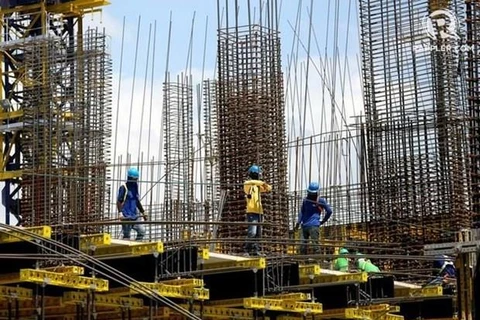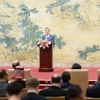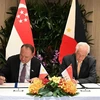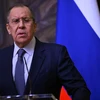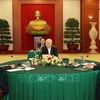Hanoi (VNA) – The central bank of the Philippines (BSP) on August 8 cut its benchmark interest rate and kept the door open for further easing to buttress the flagging economy.
The bank reduced the borrowing rate by a quarter-percentage point to 4.25 percent for the second time in the year.
The Philippines’ inflation is now expected to average 2.6 percent this year and 2.9 percent next year, the central bank said, down from its previous estimates of 2.7 percent and 3.0 percent, respectively. Both forecasts are well inside its 2 percent-4 percent target for both years.
Speaking with reporters, BSP Governor Benjamin Diokno said the benign inflation outlook provides room for further reduction in the policy rate as a pre-emptive move against the risks associated with weakening global growth.
The country's gross domestic product grew 5.5 percent in the second quarter from a year earlier, the statistics agency said, missing the median forecast for 5.9 percent growth.
On a seasonally adjusted basis, the economy grew 1.4 percent, faster than the downwardly revised 0.6 percent gain in the previous quarter.
At a news conference the same day, Philippine Economic Planning Secretary Ernesto Pernia attributed the continuing weak performance of the domestic economy to the delayed passage of the 2019 national budget and the slowdown in government spending.
He added that the country has to grow by an average of at least 6.4 percent in the second half of the year to reach the low end of the full-year growth target of 6-7 percent in 2019.
Growth could have risen by one percentage point more in the first and second quarters if the budget had been passed on time, Pernia said.
The Philippines remains one of the fastest growing economies in Asia, but rising downside risks, including simmering US-China trade tensions, put this year's growth target at risk and would likely justify further policy easing, according to economists.-VNA
The bank reduced the borrowing rate by a quarter-percentage point to 4.25 percent for the second time in the year.
The Philippines’ inflation is now expected to average 2.6 percent this year and 2.9 percent next year, the central bank said, down from its previous estimates of 2.7 percent and 3.0 percent, respectively. Both forecasts are well inside its 2 percent-4 percent target for both years.
Speaking with reporters, BSP Governor Benjamin Diokno said the benign inflation outlook provides room for further reduction in the policy rate as a pre-emptive move against the risks associated with weakening global growth.
The country's gross domestic product grew 5.5 percent in the second quarter from a year earlier, the statistics agency said, missing the median forecast for 5.9 percent growth.
On a seasonally adjusted basis, the economy grew 1.4 percent, faster than the downwardly revised 0.6 percent gain in the previous quarter.
At a news conference the same day, Philippine Economic Planning Secretary Ernesto Pernia attributed the continuing weak performance of the domestic economy to the delayed passage of the 2019 national budget and the slowdown in government spending.
He added that the country has to grow by an average of at least 6.4 percent in the second half of the year to reach the low end of the full-year growth target of 6-7 percent in 2019.
Growth could have risen by one percentage point more in the first and second quarters if the budget had been passed on time, Pernia said.
The Philippines remains one of the fastest growing economies in Asia, but rising downside risks, including simmering US-China trade tensions, put this year's growth target at risk and would likely justify further policy easing, according to economists.-VNA
VNA




